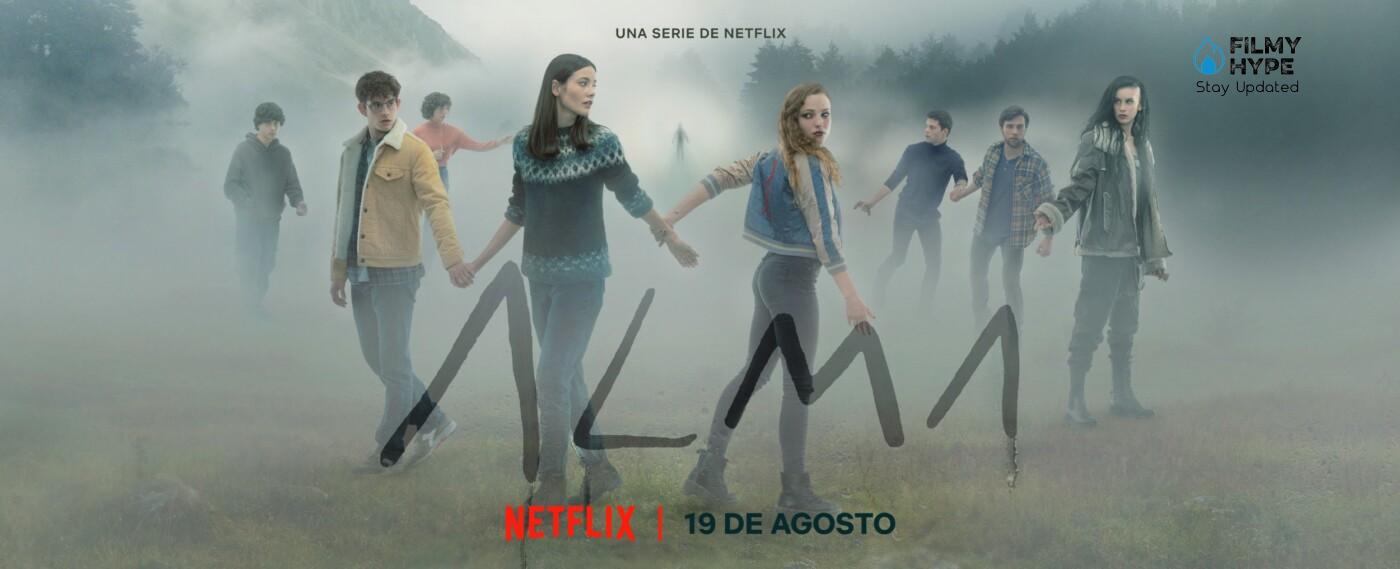The Girl in the Mirror Review: The New Supernatural Horror Series That Lands On Netflix | Alma Review
The Girl in the Mirror Review and Ratings
Starring: Mireia Oriol, Álex Villazán, Pol Monen
Creators: Sergio G. Sánchez
Streaming Platform: Netflix
Filmyhype.com Ratings: 3.5/5 (three and half stars)
Review of Alma aka The Girl in the Mirror the new Spanish Netflix supernatural horror series created by Sergio G. Sánchez (The Secret of Marrowbone). Premiere on August 19. Nine episodes make up the first season of Alma, a series that combines teen drama with supernatural terror, immediately bringing Feria: The Darkest Light, which is another Netflix fiction with a very similar cut, although in broad strokes that one is much more morbid and less round.

The Girl in the Mirror Review: The Story
The series takes its time to create its fantastic universe that drinks from Celtic mythology and borrows some elements, among which we will find symbols such as the water flower. From there, he creates an image around a deity that can reincarnate following a series of ritual steps. Alma is set in Asturias and begins by introducing us to a group of teenagers who see how a trip comes to an end. We still don’t know very well “who is who” at the beginning of the fiction, but the tensions that exist between them are clear: both dramatic and romantic.
Once reunited to return to the town, the fog hangs over the bus to the point of making it impossible to drive. When a car offers to guide the bus, it resumes its journey, but soon there is a spectacular accident in which most of the students lose their lives. Our protagonist, Alicia, however, manages to come out on top. She soon begins to experience strange situations: anomalies that only she seems to perceive, like a ghostly presence that looms before her eyes, stalking her in the dark. This is particularly frightening to her because she has lost her memory: she doesn’t remember her family, or her friends and she feels trapped. With time, he will discover that his accident was not the result of a fatal moment of absent-mindedness by the driver, but caused, and that there are very old supernatural forces that struggle to carry out a diabolical plan.
The Girl in the Mirror Review: And Analysis
Supernatural beings, demons and ghosts are some of these fantastic and terrifying ingredients that are diluted in an irregular direction and a chaotic script. And although it tries, sometimes forcing the machinery too much, the series does not end up standing out in any of the genres or topics it touches on. It even gets completely lost in a denouement in which it almost completely forgets to develop several of these elements, staying in the air to produce new seasons. Thus, as a mystery thriller, the series introduces us to its history, keeping as much information as possible. However, little by little fiction is becoming a concoction of genres and subplots in which almost anything has a place. From psychological terror, ‘jump scares’ and teen dramas to fantasy, forced romances and ‘time travel’, the proposal gives the feeling of not knowing what it wants to be and what to give more importance to.
Beyond the script, much of the blame lies with various mishaps in staging and directing. Yes, of course, the fiction has some inspired moments, as well as shots that know how to take advantage of the beautiful Asturian landscapes. However, Sánchez and company are not always able to dominate the most terrifying and tense sequences of the series, nor to represent with the same result those images proposed by the script and that overlap terror or fantasy with other more mundane and emotional elements. That said, the series uses the script and its most striking genres as a vehicle to talk about real problems such as friendship, identity, grief, mental health, or our obsession with life after death. There is a certain depth that is appreciated, but there are other elements in it that do not make much sense, such as some poorly developed characters, their motivations, or various relationships that exist simply because they do. Not to mention that it is riddled with philosophical phrases from the Facebook wall.
On the other hand, despite the good work of interpreters such as the protagonist Mireia Oriol or Claudia Roset -who share a relationship whose treatment drinks in a certain way from Bergman’s ‘ Persona’-, some interpretations are simply not up to the circumstances. But the worst thing is wasting actresses like Elena Irureta or Milena Smit in ridiculous and clichéd roles that don’t do them justice. But ‘Alma’ also has its virtues. Among them, the series can boast special effects and high-level production design, an aspect in which Spain has improved enormously lately. It is entertaining and addictive even though it progresses slowly, its mystery is interesting despite being somewhat more predictable than expected and, when it wants to, it turns out to be a genre series with a lot of potentials. It’s a shame that we are still determined to make the same mistakes in our productions, something that once again weighs down a result that could have been more remarkable.

It is clear to Sergio G. Sánchez that he is passionate about the fantasy genre and specifically he is crazy about ectoplasms. Here we find them of two types: what we could call souls in pain that remains in a plane that is beyond reality and leads them to wander between memories and animal shadows, who seek to possess bodies that are on the edge of the knife, between life and death. One of the most noteworthy aspects of Alma is the quality of the special effects: those shadows are created using rudimentary animation techniques, which makes their movement feel threatening and visceral, just as the plot requires.
But there’s also in this series a lot of love for classic horror movies and ghost movies that have scarred us for decades with references to movies like At the Bottom of the Staircase. We found several sequences that, if they had been framed in another type of product, with a more marked target, could have been part of an excellent scary movie. Although it gets a bit tangled up during its middle stretch causing some of the characters to contradict each other, the plot falls into place reasonably satisfactorily at the end. It’s a shame that the dialogues lack freshness and that some interpretations are perceived as forced because the story ends up engaging and leaves a more than likely second season in the air.
It is not difficult to predict at what point the plot will be for that and that suspicion that ends up being confirmed also reduces the impact of the outcome, but along the way issues such as guilt, mourning, legacy, identity, the strength of friendship and the obsession with transcendence or overcoming death. Although there are underexploited performers such as Milena Smit, Nacho Fresneda and others who lack tables, we also have strong pillars that give the series an essential verisimilitude to reach port: it is the case of Mireia Oriol, Claudia Roset, or Marta Belaustegui, in addition to the actors we saw in Patria Elena Irureta and Josean Bengoetxea.
The Girl in the Mirror Review: The Last Words
In a few words, you must give Alma some patience, but it ends up gelling and has all the ingredients to continue expanding and improving. At the very least, she has aroused our curiosity. Alma builds a fantasy universe of her own around the migration of souls: a promising start to a horror series that has room for improvement along the way. The technical invoice of the series, the quality of the special effects and the successful setting. It is addictive and has potential.







